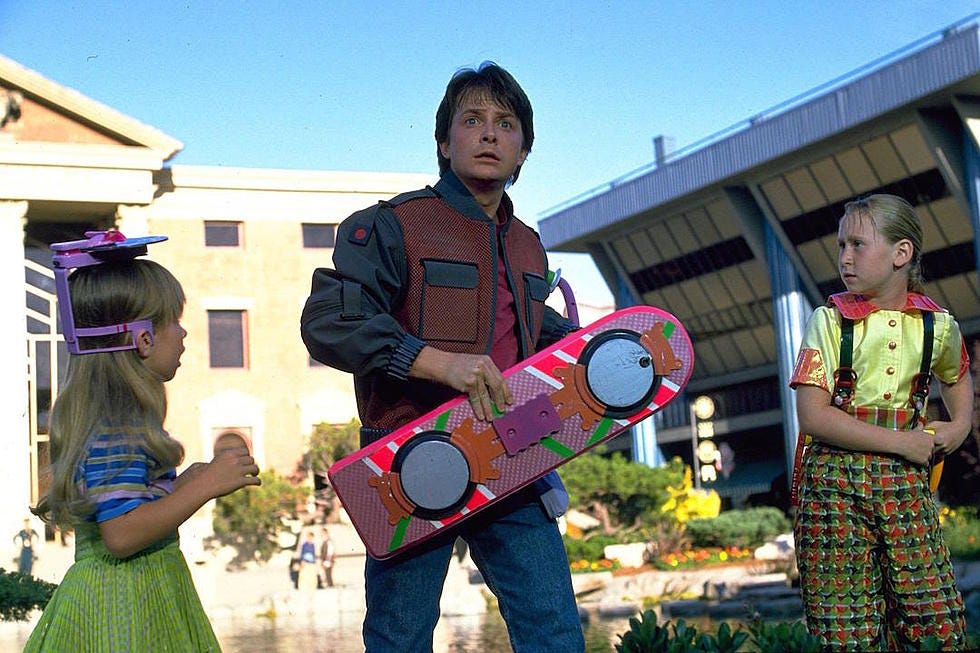Marty McFly Didn’t Aim High Enough in Back to the Future Part II (1989)
Time-travel movies are a tricky thing to pull off.
The main reason is the most obvious one: Anyone writing a novel, play, or screenplay about time travel is dealing with a pseudoscience, one where the “rules” are all made up, and yet there are certain unwritten laws of the genre by which we must abide. (I think the Bill & Ted movies actually do an excellent [😉] job of addressing the logic of time travel, but that’s for another issue.)
The thing that allows the truly great time-travel films to stand out, though, is the hook. Sure, anyone can write a narrative fiction that follows the rules we’ve agreed upon, but what new thing can you bring to the table?
In the case of Back to the Future Part II, I love the hook. Marty McFly goes to the future, sees a sports almanac, and instantly realizes that he can amass great wealth by betting on sporting events where he’s guaranteed to win. As a concept, I absolutely love it. Of course someone, especially someone his age, would think of this idea if they could visit the future. But as a plot device, I think it’s small potatoes. He could’ve done so much more. He could’ve dreamed so much bigger.
This is evidenced, of course, by the alternate reality (or “multiverse,” as the kids say) where Biff Tannen is the one who obtains the sports almanac. As the story goes, he became an overnight millionaire at the racetrack, kept on gambling, became mega-rich, and opened up a biker-friendly casino and hotel in his hometown.
According to the propaganda video at the adjoining museum within the hotel, Biff is “America’s greatest living folk hero.” But their evidence is pretty weak, especially for a puff piece. Apparently Biff successfully lobbied to “legalize gambling” (Was gambling illegal in 1989? Did I miss something?) and started Biffco Enterprises, which specializes in toxic waste disposal.
Is that really it? Biff owns a company and lives in his casino hotel? Toxic waste disposal? That’s nothing. Compared to the billionaires of today (bastards, all of them, except maybe Marc Cuban), this is kid’s stuff. Biff—or Marty—could’ve done so much more.
First of all, if Marty wanted to be obscenely rich, he should’ve invested in impending technologies. Inventing the next big thing would’ve elevated him far above any gambling winnings he would’ve amassed. And, I mean, come on—look around you, kid! There are flying cars! There are hoverboards! And that’s just from one quick visit. He could’ve stolen the idea for any life-changing doohickey and never looked back.
But then there’s the thing that all rich folks really crave: Power. Marty McFly could’ve become President. America has already proven (just one year after the “future” of this film!) that any rich idiot can be elected, and President McFly wouldn’t even have to go that route. Just grab a textbook, study the socio-cultural landscapes of the coming decades, hone in on the issues voters care about, and steal from the best speeches. He’d be a shoe-in for either party.
The ultimate coup Marty could’ve pulled off, though, is an even higher power grab. That’s right: Marty should’ve started his own religion.
Think about it. Evangelical nutjobs are constantly trying to predict the end of the world and other cataclysmic events, and they’re always wrong—mostly because they’re idiots, but also, perhaps, because they don’t have access to a time machine. Sports are cool, but imagine if Marty could predict elections, wars, natural disasters. He’d be Jesus in a ski vest. He’d amass millions of followers. He’d be unstoppable.
Okay, let me be clear: I am not actually endorsing any of these things. If I was a billionaire, I would simply own an NBA team and a movie studio (again, like Marc Cuban). I would not even consider running for political office (too stressful) or starting a cult (too messy). I apologize if I sounded absolutely unhinged for a few paragraphs back there.
I’m just saying, McFly. It’s there for the taking.
Back to the Future Part II is now streaming on Netflix and AMC+, and it’s available to rent elsewhere.



